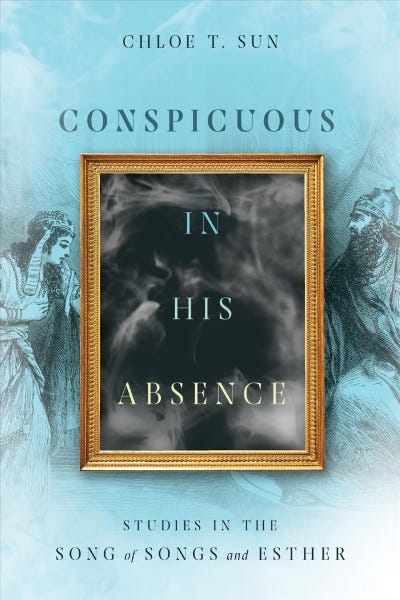Conspicuous in His Absence: Studies in the Song of Songs and Esther
Book Review by Dr. Jill Firth
Chloe T. Sun.
Conspicuous in His Absence: Studies in the Song of Songs and Esther.
Downers Grove: IVP, 2021 (326 pages).
Reviewed by Dr. Jill Firth
Song of Songs and Esther are notable in the Old Testament as neither mentions God directly. In Esther, various ‘coincidences’ hint at the activity of a hidden God behind the scenes, but Song of Songs presents an erotic dialogue between a pair of idealized lovers. Chloe Sun looks at these two books with three questions in mind: What is the nature of God as revealed in texts that don’t use his name? How do we think of God when he is perceived as absent? What should we do when God is silent or hidden?
Sun begins with two chapters on Theology and Absence. These chapters reflect on previous scholarship, and present the books as ‘countertexts’ within the Wisdom tradition. The next two chapters explore time and place. Chapter 3 contrasts the fluidity of time in the Song to linear time in the narrative of Esther. Chapter 4 connects the lush surroundings of the Song to the Garden of Eden, and then to the Temple, and seeks also to link the palace of the Persian king in Esther to the Temple. While there seem to be fewer warrants for this second proposal, the book of Esther is commonly connected with the Temple in later Jewish thought. Perhaps there is also a contrast between the showy but ineffectual kingship of Ahasuerus and the more invisible but effective reign of God.
A further interest of the book is the unpacking of the connection between Passover and Song of Songs. The relevance of Esther to the festival of Purim is obvious from the narrative’s description of the origin of Purim, but we may wonder why Song of Songs is read in Jewish tradition at Passover. In Chapter 5, Sun points us to early Jewish tradition linking Song of Songs to the intimacy of God with Israel in the Exodus. Song of Songs Rabbah is seen by rabbis as a ‘commentary’ on Exodus, and the Targum of the Song of Songs also connects the Song to Exodus. The Targum says on Song of Songs 2:9 that on the night of the Passover, God was looking through the windows of the houses ‘and He saw the blood of the Passover sacrifice and the blood of the decree of circumcision marked on our doors.’ On Song 8:1-2, the Targum comments that ‘King Messiah’ will be a brother to the children of Israel, and they will go up to the Temple and ‘drink (from) old wine which has been preserved in its grapes from the day the world was created, and from pomegranates and fruits which are prepared for the righteous in the Garden of Eden.’ (Citations from Alexander, Targum, in Conspicuous, 206, 209.) This targum was widely circulated in the medieval period, testifying to its popularity, and over sixty manuscripts remain in libraries around the world.
A final chapter notes the contribution to the canon of Song of Songs and Esther. Connections across scripture are examined, and differences noted. ‘The literary absence of God in Song of Songs and Esther suggests that God does not always conform to the expectations of the normal pattern of Scripture, such as the books of Exodus or Daniel.’ Sun concludes with pastoral reflections on the experience of God’s seeming absence.
Conspicuous in His Absence offers many insights into God’s relationship with his people. Its pastoral approach enhances the value of these biblical books for anyone who is experiencing God as absent. Along with lament Psalms, the book of Job, and the cries of prophets such as Jeremiah, Song of Songs and Esther invite us to deepen our relationship with God even when he seems silent or hidden.
Jill Firth is Lecturer in Hebrew and Old Testament at Ridley College, Melbourne.





This article is captivating and deals with a subject long forgotten. I am very interested in purchasing the book after reading it.